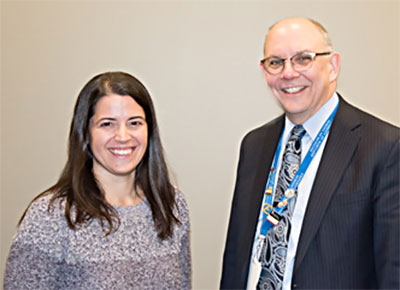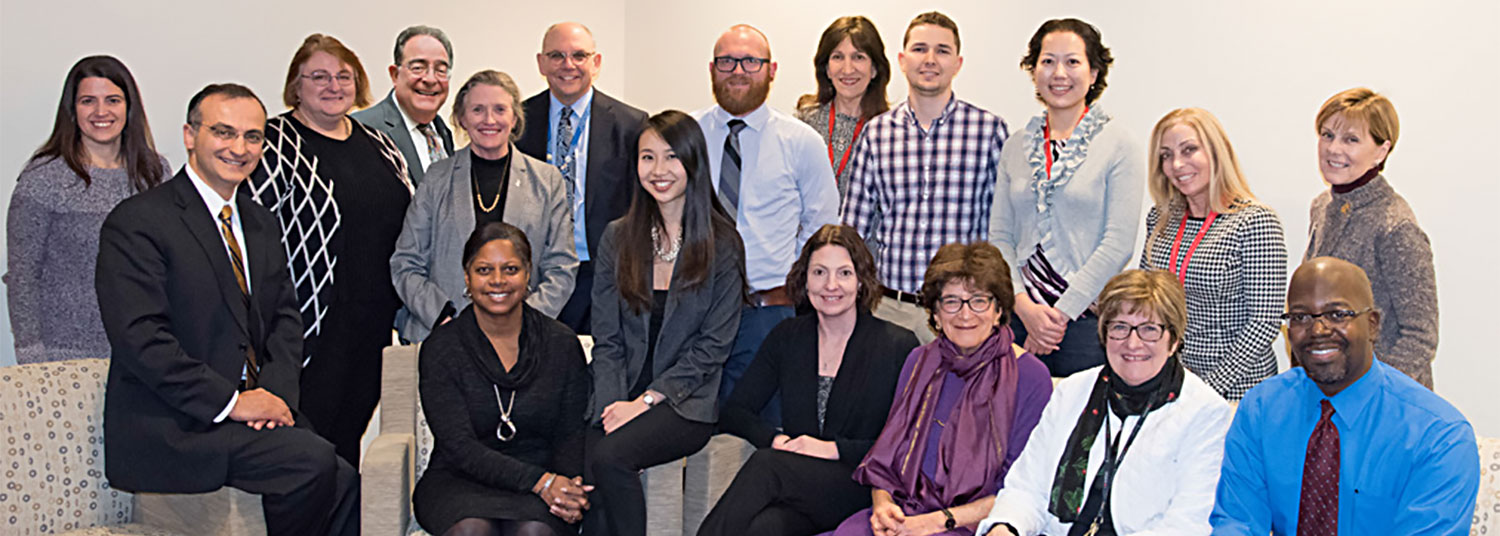2017-2018 IPE Seed Grant Symposium
January 5, 2019
The President's Message
Author: Mary T. Phelan
Seed Grants Spur IPE Collaboration
It’s a delicate activity that many young health care professionals feel they don’t do well: talking to patients and their families about the important topic of advance care planning.
Leah Millstein, MD, an assistant professor at the School of Medicine, once felt that way. It eventually led her to apply for and receive a University of Maryland, Baltimore (UMB) Interprofessional Education (IPE) seed grant to design a project that would help doctors and nurses feel more at ease when discussing advance care irectives and living wills with patients. Millstein shared her story at the 2017-2018 IPE Seed Grant Symposium held Dec. 13 at the Southern Management Corporation Campus Center. Five other teams also presented the results of their IPE seed grant projects.

Leah Millstein, MD and David Mallott, MD, Co-Director, UMB Center for Interprofessional Education
"It was a very challenging family,” Millstein recalled. “The patient had Parkinson’s and could not easily communicate his own wishes. The daughter and stepmother were not seeing eye to eye and I was lucky to have the opportunity to be able to work with a social worker."
A longstanding meeting was set up that included Millstein, the social worker, a neurologist, and the family.
"It really opened my eyes as to how much easier this was to do as a team, when I was really struggling to get anywhere with the family by myself," she said.
Her IPE seed grant project was aimed at enhancing knowledge and comfort of medical, social work, and nursing students on the critical topic of advance care planning, while also providing them with firsthand experience of multidisciplinary collaboration and, specifically, team-based care delivery.
"We wanted to provide students as early learners with these skills because they’re going to be in these situations throughout their careers," Millstein said.
During the 2017-2018 academic year, students from the School of Medicine (SOM), School of Social Work (SSW), and School of Nursing (SON) were educated on various advance care planning topics during an educational seminar administered by faculty from SOM and SSW. Students collaborated in an interdisciplinary clinical encounter dedicated to advance care planning at the University Health Clinic. The students’ experiences were assessed with a series of surveys, with the expectation that participation will improve the students’ comfort and ability to address advance care planning.
The team began by assessing the current state of advance directive completion in the outpatient internal resident medicine clinic. They looked at 291 patient charts. Of those, 269 met the team’s inclusion criteria, and only three of those 269 patients had a documented advance directive on file as part of their electronic medical record.
“That was a rate of 1.1 percent, which demonstrates that this is not being done,” Millstein said.
Internal medicine residents worked with the same social worker Millstein had earlier befriended and patients’ family members to discuss advance care planning and had students observe the interactions.
Many of the students said they had no previous experience in advance care planning and rated their ability to break bad news and facilitate conversations about advance directives as “pretty poor,” Millstein said. At the end of the grant project “we had outcome improvement in all areas,” she added.
UMB has placed a high priority on IPE, which is recognized in the University’s 2017-2021 Strategic Plan. During opening remarks at the IPE Seed Grant Symposium, UMB President Jay A. Perman, MD, said teambased care is better care for patients and providers alike. “It results in better outcomes with greater satisfaction on the part of patients and greater satisfaction on the part of those of us who provide care,” he said.
He also gave credit to Jane M. Kirschling, PhD, RN, FAAN, director of UMB’s Center for Interprofesssional Education and dean of the SON.
“She’s the person who keeps this alive, this onward and upward march that we insist on here at UMB in developing the right way to teach interprofessional health care delivery and the right way to deliver interprofessional health care,” Perman said. “I need to thank everybody in this room for your commitment to exploring and expanding this vision of team-based health care. What you are doing with the seed grants that you successfully competed for is to do something that is exceedingly necessary in growing team-based care as an important model for health care delivery.”
A list of the projects and UMB team members:
A new era of “See one. Do one. Teach one.” Using an Interprofessional Education Module to Learn, Teach, and Optimize the Treatment of Sepsis
Nirav Shah, MD, FCCP (SOM); Jeffrey Gonzales, PharmD, FCCM, BCPS, BCCCP (previously School of Pharmacy SOP); Joan Davenport, PhD, RN (SON); Renee Dixon, MD (SOM); Mojdeh Heavner, PharmD, BCPS, BCCCP (SOP); Samuel Tisherman, MD, FACS, FCCM (SOM); Tracey Wilson, DNP, ACNP (SON); Siu Yan Amy Yeung, PharmD (SOP)
Building UMB’s Interprofessional Continuing Education Capacity (IPCE)
Patricia Franklin, PhD, RN (SON); Seante Hatcher, LCSW-C (SSW); Jason Noel, PharmD, BCPP (SOP); Chanise Reese- Queen, CMP, MSA (SOM); Anita Tarzian, PhD, RN (SON and Carey School of Law)
Expansion of IPE Clinics in Montgomery County
Gina Rowe, PhD, DNP, MPH, FNP-BC, PHCNS-BC, CNE (SON); Heather Congdon, PharmD, BCPS, CDE (SOP); Claire Engers, JD, MSW, LCSW-C (SSW); Talia Gimeno, LCSW-C (SSW); Jana Goodwin, PhD, RN, CNE (SON); Barbara Nathanson, LCSW-C (SSW); Joan Pittman, PhD, MSW, LCSW-C (SSW)
Interprofessional Approach to Advance Care Planning
Leah Millstein, MD (SOM); Amanda Agarwal, LCSW-C (SSW); John Allen, MD (SOM); Danielle Baek, MD (SOM); Melissa Bellin, PhD, LCSW (SSW); John Cagle, PhD, MSW (SSW); Joan Davitt, PhD, MSW, MLSP (SSW); Steven Eveland, MBA, RN, CHPN (UMMC)
IPE Care in Geriatrics – Expanding Opportunities of Aging in Place Program (UMB_APP) in West Baltimore
Nicole Brandt, PharmD, MBA, BCPP, CGP, FASCP (SOP); Reba Cornman, MSW (Graduate School); Kelly Doran, PhD, RN (SON); Sarah Dee Holmes, MSW (SSW); Daniel Mansour, PharmD, BCGP, FASCP (SOP): Barbara Resnick, PhD, CRNP, FAAN, FAANP (SON); Norman Retener, MD (SOM); Bernadette Siaton, MD (SOM); Everett Smith, LGSW (SSW)
Building a High Reliability Organization – Interprofessional Development for Safer Care
Mangla Gulati, MD, CPPS, FACP, SFHM (SOM); Alison Duffy, PharmD, BCOP (SOP); Emily Heil, PharmD, BCPS-AQ ID, AAHIVP (SOP); Deborah Schofield, PhD(c), DNP, CRNP, FAANP (SON); Kerri Thom, MD, MS (SOM)

